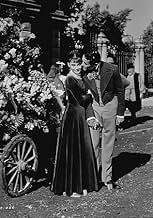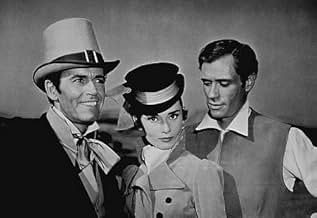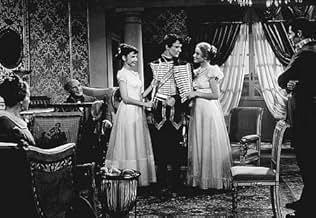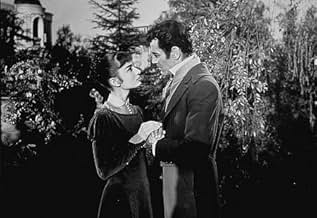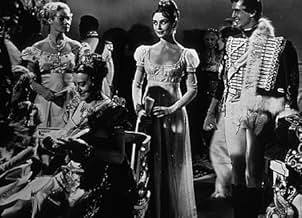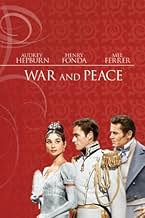Napoleon's tumultuous relations with Russia, including his disastrous 1812 invasion, serve as the backdrop for the tangled personal lives of two aristocratic families.Napoleon's tumultuous relations with Russia, including his disastrous 1812 invasion, serve as the backdrop for the tangled personal lives of two aristocratic families.Napoleon's tumultuous relations with Russia, including his disastrous 1812 invasion, serve as the backdrop for the tangled personal lives of two aristocratic families.
- Nominated for 3 Oscars
- 6 wins & 13 nominations total
- Prince Bolkonsky
- (as Wilfred Lawson)
Featured reviews
Anyway, War and Peace is a most worthwhile film experience for Vidor and Cardiff's Technicolor Vistavision visuals, for the screenplay which is often quite beautifully written, and for many fine performances from some exceedingly charismatic film actors, especially the astonishing Audrey Hepburn. There are close-ups of her that will make your heart stop.
The narrative here focuses mainly on just three of Tolstoy's characters – Pierre, Natasha and Alexei – portrayed by Henry Fonda, Audrey Hepburn and Mel Ferrer respectively. Fonda is really too old to play the youthful Pierre, but he is not as severely miscast as some have said, pulling off the early scenes of Pierre as the gangly, drunken student with a fair degree of believability. Hepburn brilliantly handles the aging of her character, transforming the naïve teenager into a mature and confident woman while still maintaining the same core persona. If only something as complementary could be said of Mel Ferrer, who takes to acting the same way anvils take to floating. His appallingness is matched only by the woman who plays his wife, Milly Vitale. There are some decent supporting players though. Herbert Lom gives a surprisingly heartfelt performance as Napoleon. Oskar Homolka brilliantly plays the archetypal scruffy old general who's too high-ranking and experienced to bother with all that decorum business, his gestures forceful but with a half-hearted brevity to them. And John Mills is bizarrely like someone out of a Monty Python film.
Director King Vidor was a veteran of old Hollywood and just the sort of director to handle the mix of big canvas and intimacy. He shows what must have been extraordinary patience in setting up hordes of extras, carts and cannons for authentic looking crowd scenes, but then makes them a briefly glimpsed backdrop, never really dwelling on the massive scope or showing it off for its own sake. This seemingly contradictory tack gives us a sense of the story happening in a real place, but never allows it to detract from the main players and their stories. Vidor is constantly implying things with the simplest of cinematic tricks, and this helps to make up for the gaps in plot that the adaptation necessitates. For example, when Hepburn and Vittorio Gassman kiss at the opera, the angle gradually changes to reveal the reflection of a door in a mirror. This subtle move plants the idea in our heads that someone may walk in on them, and it gives the moment a sense of unease and wrongness. Vidor's canny ability to suggest mood and temperament, particularly evident in his framing of the inner monologues during the dance scene, also helps to cover any deficit in the acting.
At three-and-a-half hours, this is still quite a long old movie. And yet, thanks to some compelling imagery and strong narrative it moves faster than many a 90-minuter. Shorn of much of Tolstoy's original material as it is, it is still long enough to give us that feeling of the passage of time and development of character, to make Fonda's transition from a foppish lad in Western European attire to a bearded man in Russian garb feel like more than just a change of clothes. This version of War and Peace certainly has a fair few things wrong with it, yet still manages to be a lucid and passionate – if not entirely faithful – adaptation of a great work of literature.
The movie does suffer from two undeniable shortcomings. First is the atrocious sound recording that has blighted virtually every Italian movie ever made. As some of the comments have noted, movies shot at Rome's Cinecitta had their sound post-dubbed rather than recorded on the set. But actually, this practice was then (and remains) very common. The sound in Italian movies stands out simply because they were so bad at it. The brutal truth is, even the greatest masterpieces of Fellini, De Sica, Rosselini, etc. are less than they might have been because Italian sound technology was so slipshod. And so it is with WAR AND PEACE: it's hard to suspend disbelief when soldiers struggling across a river sound like someone dropping quarters into a toilet.
The other shortcoming is the appalling miscasting of Henry Fonda as Pierre Bezhukov. It's the worst performance of his career, and he looks and sounds about as Russian as a slice of pumpkin pie. One commenter here said Alec Guinness should have played Pierre. It's an intriguing suggestion, and of course Sir Alec was always good. Even better, I think, would have been Peter Ustinov. In 1956 he was Pierre to the very life.
But the rest of the casting is genuinely inspired. Oskar Homolka as Gen. Kutuzov, Barry Jones as Count Rostov, Jeremy Brett as Nikolai, Herbert Lom as Napoleon -- all could hardly be improved upon. And Audrey Hepburn was simply born to play Natasha. And Mel Ferrer as Prince Andrei ... well, he did have his faults as an actor (to say the least!), but at least he looked the part.
Beyond that, the movie has lavish production values, impressive battle scenes, and one truly great and powerful sequence, the French Army's disastrous retreat from Russia, that takes up much of the last hour.
There's no substitute, of course, for reading the novel (I've read it three times myself). But this 1956 movie makes a worthy introduction, and even helps to keep Tolstoy's complex plot straight when you do get around to reading it.
Did you know
- TriviaAudrey Hepburn's character was supposed to be thirteen when the movie begins. She was twenty-seven when this movie came out.
- GoofsThe marching band in the opening parade are all playing modern musical instruments.
- Quotes
Prince Andrei Bolkonsky: There must be something you want to do.
Pierre Bezukhov: I want to discover... everything! I want to discover why I know what's right and still do what's wrong. I want to discover what happiness is, and what value there is in suffering. I want to discover why men go to war, and what they really say deep in their hearts when they pray. I want to discover what men and women feel when they say they love.
- Crazy creditsClosing credits epilogue: The most difficult thing - but an essential one - is to love Life, to love it even while one suffers, because Life is all. Life is God, and to love Life means to love God. Tolstoy "WAR and PEACE"
- Alternate versionsTwo different versions of the main titles exists. Both of them in English. In the one, the credits are set against a neutral background, in the other against details of a painting of Napoleon in front of his troops.
- ConnectionsEdited into L'Excellente Aventure de Bill & Ted (1989)
- How long is War and Peace?Powered by Alexa
Details
- Release date
- Countries of origin
- Official site
- Languages
- Also known as
- War and Peace
- Filming locations
- Production company
- See more company credits at IMDbPro
Box office
- Budget
- $6,000,000 (estimated)
- Gross worldwide
- $24,874
- Runtime3 hours 28 minutes
Contribute to this page



